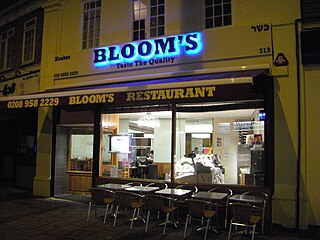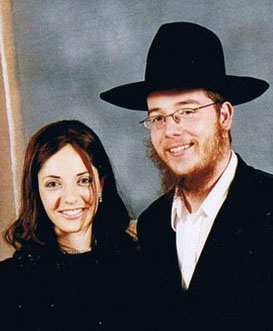| Total population | |
|---|---|
| 40,000 - 70,000 | |
| Regions with significant populations | |
| Goa · Maharashtra · Delhi · Telangana · Karnataka | |
| Languages | |
| Hebrew · Marathi · Konkani · Telugu · Kannada · Hindi | |
| Religion | |
| Judaism | |
| Related ethnic groups | |
| Indian Jews |
Israelis in India may be immigrants and expatriates from Israel, or Israelis residing in India - many of Indian Jewish descent. Many of them reside in Goa, [1] Thane and Raigad districts of Maharashtra. Some have started businesses such as restaurants and boutiques. The most spoken languages among Jewish Indians and Israelis in India tend to be Marathi, Konkani and Hindi as well as their native language of Hebrew. [2]
Kashrut is a set of dietary laws dealing with the foods that Jewish people are permitted to eat and how those foods must be prepared according to Jewish law. Food that may be consumed is deemed kosher, from the Ashkenazi pronunciation of the term that in Sephardi or Modern Hebrew is pronounced kashér, meaning "fit". Food that may not be consumed, however, is deemed treif, also spelled treyf. In case of objects the opposite of kosher is pasúl

Israelis are the citizens and nationals of the State of Israel. The country's populace is composed primarily of Jews and Arabs, who respectively account for 75 percent and 20 percent of the national figure, followed by other ethnic and religious minorities, who account for 5 percent.

Cochin Jews are the oldest group of Jews in India, with roots that are claimed to date back to the time of King Solomon. The Cochin Jews settled in the Kingdom of Cochin in South India, now part of the present-day state of Kerala. As early as the 12th century, mention is made of the Jews in southern India by Benjamin of Tudela.

The State of India, also referred as the Portuguese State of India or simply Portuguese India, was a state of the Portuguese Empire founded six years after the discovery of the sea route to the Indian subcontinent by Vasco da Gama, a subject of the Kingdom of Portugal. The capital of Portuguese India served as the governing centre of a string of military forts and maritime ports scattered along the coasts of the Indian Ocean.

Konkani is an Indo-Aryan language spoken by the Konkani people, primarily in the Konkan region, along the western coast of India. It is one of the 22 scheduled languages mentioned in the Indian Constitution, and the official language of the Indian state of Goa. It is also spoken in Karnataka, Maharashtra, Kerala, Gujarat as well as Damaon, Diu & Silvassa.
The history of the Jews in India dates back to antiquity. Judaism was one of the first foreign religions to arrive in the Indian subcontinent in recorded history. Desi Jews are a small religious minority who have lived in the region since ancient times. They were able to survive for centuries despite persecution by Portuguese colonizers and nonnative antisemitic inquisitions.
Netivot HaTorah Day School is a private, coeducational Orthodox Jewish elementary school in Thornhill, Ontario, Canada. As of 2008, it enrolls 600 students from Junior Kindergarten to Grade 8. The school is affiliated with Mercaz, the educational pillar of the UJA Federation of Greater Toronto.

Since the 1990s, the Republic of India and the State of Israel have had a comprehensive economic, military, and political relationship. In 1947, India voted against the United Nations Partition Plan for Palestine, but nonetheless recognized Israeli sovereignty in 1950. Israel opened a consulate in Bombay in 1953. Collaboration gradually increased as Israel became a key Indian ally amidst the India–Pakistan conflict; Israel supplied India with armaments, ammunition, and intelligence during the Indo-Pakistani War of 1971 and the Indo-Pakistani War of 1999. Full diplomatic relations were established in 1992, when India opened an embassy in Tel Aviv and Israel opened an embassy in New Delhi. Both countries are members of the I2U2 Group, formed in October 2021, and have stated that they have a strong bilateral relationship, sharing similarities in spirit and facing common challenges, increasingly cooperating in the industrial and technological sectors.

Star-K Kosher Certification, also known as the Vaad Hakashrut of Baltimore, is a kosher certification agency based in Baltimore, Maryland, under the administration of Rabbi Moshe Heinemann, with the involvement of many other rabbis. It is one of the largest Jewish dietary certification agencies in North America. It is trusted by many Orthodox Jews worldwide for dedication to preserving Kashrut. The organization supervises tens of thousands of commercial food products and food establishments around the world.

A kosher restaurant or kosher deli is an establishment that serves food that complies with Jewish dietary laws (kashrut). These businesses, which also include diners, cafés, pizzerias, fast food, and cafeterias, and are frequently in listings together with kosher bakeries, butchers, caterers, and other similar places, differ from kosher-style businesses in that they operate under rabbinical supervision, which requires the observance of the laws of kashrut, as well as certain other Jewish laws, including the separation of meat and dairy.

Indian Jews in Israel are immigrants and descendants of the immigrants of the Indian Jewish communities, who now reside within the State of Israel. Indian Jews who live in Israel include thousands of Cochin Jews and Paradesi Jews of Kerala; thousands of Baghdadi Jews from Mumbai and Kolkata; tens of thousands from the Bene Israel of Maharashtra and other parts of British India and the Bnei Menashe of Manipur and Mizoram.

The Nariman House, designated as a Chabad house, is a five-storey landmark in the Colaba area of South Mumbai, Maharashtra, India. The building was home to a Chabad house, a Jewish outreach centre run by Gavriel and Rivka Holtzberg, who had owned the building since around 2006. The centre had an educational center, a synagogue, offered drug prevention services, and a hostel.

Gavriel Noach Holtzberg (Hebrew: גבריאל נח הולצברג; June 9, 1979 – November 26, 2008 was an Israeli American Orthodox rabbi and the Chabad emissary to Mumbai, India, where he and his wife Rivka ran the Mumbai Chabad House. He was also a religious leader and community builder for the local Jewish Indian community, and led the Friday-night Shabbat services at the Knesset Eliyahoo synagogue. Holtzberg and his wife were murdered during the 2008 Mumbai attacks perpetrated by the Islamic militant group Lashkar-e-Taiba.

The history of the Jews in Mumbai, India, began when Jews started settling in Bombay during the first century, due to its economic opportunities. The Jewish community of Bombay consisted of the remnants of three distinct communities: the Bene Israeli Jews of Konkan, the Baghdadi Jews of Iraq, and the Cochin Jews of Malabar.

Sephardic Jews in India are Iberian Jews who settled in many coastal towns of India, in Goa and Damaon, Madras and, primarily and for the longest period, on the Malabar coast in Cochin. After the Portuguese discovery of the sea route to India in the 1498, a number of Sephardic Jews fled Antisemitism in Iberia which had culminated in the Edict of Expulsion in 1492 and Persecution of Jews and Muslims by Manuel I of Portugal. They settled in Portuguese Indian trading places so that they could continue practicing Judaism secretly while still remaining within the Portuguese Empire. After the Portuguese Inquisition was established, an additional number of falsely-converted Sephardic Jews made sea voyages to settle in India, because it would then be difficult for the Inquisition to investigate and punish them. They spoke the vernacular language of their kingdom and some of them also Arabic.

Goa is a state on the southwestern coast of India within the Konkan region, geographically separated from the Deccan highlands by the Western Ghats. It is bound by the Indian states of Maharashtra to the north, and Karnataka to the east and south, with the Arabian Sea in the west. It is India's smallest state by area and fourth-smallest by population. Goa has the highest GDP per capita among all Indian states, two and a half times as high as the GDP per capita of the country as a whole. The Eleventh Finance Commission of India named Goa the best-placed state because of its infrastructure, and India's National Commission on Population rated it as having the best quality of life in India. It is the second-highest ranking among Indian states in the human development index.
Hinduism and Judaism are among the oldest existing religions in the world. The two share some similarities and interactions throughout both the ancient and modern worlds.

Burgers Bar is an Israeli burger chain with 30 locations around Israel, and previously had three locations in the United States.
Ethiopian Jewish cuisine is the cuisine of the Beta Israel. The cuisine of the Ethiopian Jews is similar to the cuisine of other Ethiopians, with some variations.
{{cite news}}: CS1 maint: bot: original URL status unknown (link)